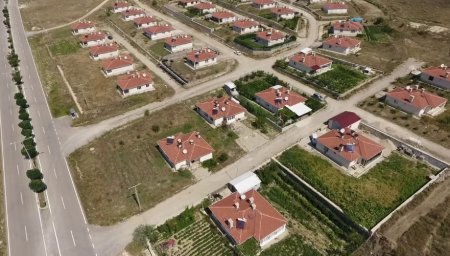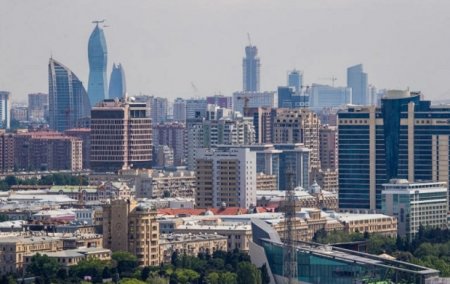
Fitch Ratings Azərbaycanın uzunmüddətli xarici valyutada emitent defoltu reytinqini (IDR) "BB+" səviyyəsində, "müsbət" proqnozla təsdiqləyib.
Bu barədə Sahibkartv.az Fitch Ratings-in yaydığı məlumata istinadən xəbər verir
Qeyd edilib ki, reytinq və müsbət proqnoz - çox güclü xarici balansı, ən aşağı dövlət borcu və iri maliyyə ehtiyatları ilə dəstəklənir.
Bu müsbət amillər ilə bərabər mənfi amillər - zəif idarəetmə göstəriciləri, iqtisadi siyasətin müəyyən edilməsinin proqnozlaşdırıla bilməməsi, yüksək maliyyə dollarlaşması, karbohidrogenlərdən ağır asılılıq və geosiyasi risklərdir.
"Müsbət" proqnoz dövlət büdcəsindən yüksək enerji qiymətləri və əvvəlki enerji sektorunda gözlənilməz nəticələrə nisbətən daha çox xərc məhdudlaşdırılması səbəbindən xarici və fiskal buferlərin davamlı gücləndirilməsini əks etdirir.
"Cari əməliyyatlar hesabının profisiti 2023-cü ildə ÜDM-in 19%-nə qədər azalacaq, lakin “BB” kateqoriyasında ən yüksək olaraq qalır. Neft qiymətlərinin aşağı düşməsinə baxmayaraq (neft və qaz gəlirləri ümumi ixracın 90%-nə bərabərdir) 2024-2025-ci illərdə ikirəqəmli profisit gözləyirik. Buna görə də biz proqnozlaşdırırıq ki, 2023-cü ildə suveren xarici valyuta aktivləri 68 milyard ABŞ dollarına çatacaq ki, bunun da 82%-i ARDNF-də olacaq. Biz Azərbaycanın xalis suveren aktivlərinin mövqeyinin 14 faiz bəndi artaraq 2023-cü ildə ÜDM-in 63%-nə və 2025-ci ilə qədər 72%-ə çatacağını proqnozlaşdırırıq ki, bu da ölkənin təmsil olunduğu qrupda ən yüksək göstəricidir",- Fitch qeyd edib.
Fitch qeyd edib:
İnflyasiya
İllik inflyasiya manatın Türkiyə və Rusiya kimi əsas ticarət tərəfdaşlarına nisbətən nominal effektiv bahalaşması və dünya ərzaq qiymətlərinin ucuzlaşması ilə dəstəklənir. Buna baxmayaraq, ərzaq vəəsasən xidmətlər üzrə təzyiqlər güclü olaraq qalır. Biz illik inflyasiyanın 2023-cü ilin sonuna qədər Azərbaycan Mərkəzi Bankının hədəf diapazonunun tavanına (4±2%) yaxınlaşacağını proqnozlaşdırırıq, beləliklə, orta inflyasiya 2023-cü ildə 10,1%-ə, 2024-cü ildə isə 6%-ə enəcək. Yüksək əmtəə qiymətləri və tələb tərəfi təzyiqləri inflyasiya riskini əks etdirir.
İqtisadi artımı:
Neft və qeyri-neft iqtisadiyyatlarında 2023-cü ilin birinci yarısında yavaşlamadan sonra 2023-cü ildə 1,8% artım proqnozlaşdırırıq. Biz 2024-2025-ci illərdə qeyri-neft iqtisadiyyatının artımı hesabına artımın orta hesabla 2,3% olacağını gözləyirik.
XXX
Fitch Affirms Azerbaijan at 'BB+'; Outlook Positive
Fitch Ratings has affirmed Azerbaijan's Long-Term Foreign-Currency Issuer Default Rating (IDR) at 'BB+' with a Positive Outlook.
A full list of rating actions is at the end of this Rating Action Commentary.
KEY RATING DRIVERS
Rating Fundamentals, Positive Outlook: The rating is supported by a very strong external balance sheet, the lowest public debt in the peer group, and financing flexibility from large sovereign wealth fund assets. Set against these factors are weak governance indicators, lack economic policy-making predictability, high financial dollarisation, heavy dependence on hydrocarbons, and geopolitical risks. The Positive Outlook reflects continued strengthening of external and fiscal buffers due to higher-than-budgeted energy prices, and greater expenditure restraint than in previous energy sector windfalls.
Strengthening External Position: The current account surplus will decline to 19% of GDP in 2023, but remains the highest in the 'BB' category. We expect surpluses in double digits in 2024-2025 despite lower oil prices (oil and gas revenues equal 90% of total exports). We therefore forecast sovereign foreign-currency assets will increase to USD68 billion in 2023, 82% held by SOFAZ, reflecting still-high energy revenues and investment portfolio recovery. We project Azerbaijan's net sovereign asset position to increase by 14pp to 63% of GDP in 2023 and 72% by 2025, the highest in the peer group.
Continued Fiscal Surpluses, Developing Fiscal Rule: Fitch expects higher-than-budgeted oil prices and non-oil revenue growth to underpin continued surpluses despite increased reconstruction spending. We forecast the consolidated budget surplus at 5.6% of GDP in 2023, before declining to 1.4% in 2025. Azerbaijan's 2022 fiscal rule seeks to reduce the non-energy primary deficit to 17.5% of non-oil GDP in 2026 (22.7% in 2022) and set a public debt ceiling of 30% (previously 20%) of GDP.
Fitch considers that the rule has a limited track record, and a weak institutional framework in terms of oversight and establishment of fiscal targets. In our view, the latter could be modified, as the recent change in the debt ceiling shows. Lower nominal GDP and slower non-oil tax revenue growth could increase the challenges of sustainably maintaining the non-energy primary deficit's reduction, especially given large Karabakh-related expenditure commitments.
Government Debt Increase: The debt ceiling increase, from 20% to 30% of GDP, was to include AZM9.5 billion (7.5% of GDP) guaranteed debt from Agrarkredit in government debt. Fitch therefore forecasts debt to increase to 21.4% of GDP in 2023, the lowest in the 'BB' category. Outstanding external government guarantees and on-lending declined from USD6.4 billion at end-2022 to USD6.2 billion (8.3% of GDP) in 1H23.
Limited-Predictability Policy Framework: A lack of policy predictability, institutional independence, and clarity of mandates for the Central Bank of Azerbaijan (CBA) and SOFAZ within the broader exchange-rate framework persist, increasing the risk of a disruptive adjustment to a very severe shock. The CBA uses the exchange rate as the intermediate operational target and introduced instruments to improve transmission into the money market and banking rates.
We consider there is still a strong political prioritisation to maintain the 1.7 AZN/USD de facto peg, despite the authorities' stated aim of allowing greater flexibility in the medium term.
Inflation Declining: Annual inflation is falling supported by the nominal effective appreciation of the manat relative to main trading partners such as Turkiye and Russia and easing of world food prices. Nevertheless, pressures in food and non-tradables (most notably services) remain strong. We forecast annual inflation to approach the CBA target band ceiling (4±2%) by end-2023, so average inflation will decline to 10.1% in 2023 and 6% in 2024. Higher commodity prices and demand-side pressures represent risks to disinflation.
Weak Trend Growth: We forecast growth of 1.8% in 2023, after a slowdown in 1H23 in the oil and non-oil economies. We expect growth to average 2.3% in 2024-2025 due to the non-oil economy growth, while the energy sector drag could ease due to new oil production that could slow the decline (7.6% fall in 2022 to 676,000 barrels a day). We also expect further natural gas production growth with potential upside if purchasing contracts to increase export volumes to Europe are finalized.
Progress towards economic diversification is constrained by the large state presence, limited access to financing, governance challenges and low non-energy foreign investment.
Banking Fundamentals Steadily Improving: The banking sector has improved, but is still fairly weak, reflected by Fitch's Banking System Indicator score of 'b'. The non-performing loan ratio fell to 3.5% in July, from 3.8% at end-2022, helped by strong loan growth.
Capitalization remains adequate at 17.8%, and the sector remains profitable, supported by rising loan portfolio interest income, while the interest-rate increase does not affect funding costs due to the prevalence of demand deposits. Deposit dollarisation fell to 42% in July from 60% at end-1H20 but is well above the peer group historical median of 35%; foreign-currency loans fell to 19% of the sector loan book from 35% in that period.
High Geopolitical Risks: Geopolitical risks from the Karabakh conflict remain high, with sporadic fighting since the 2020 war. The US and EU have supported negotiations, but no political settlement has been reached. Closure of the Lachin corridor to Armenia has exacerbated frictions. Recently, Azerbaijan and Armenia have both reported troop build-up at their borders. Fitch believes that in the event of a military conflict with Armenia, fighting would largely be limited to the disputed region, and broader macroeconomic implications for Azerbaijan limited.
ESG - Governance: Azerbaijan has an ESG Relevance Score (RS) of '5' for both Political Stability and Rights and for the Rule of Law, Institutional and Regulatory Quality and Control of Corruption. These scores reflect the high weight that the World Bank Governance Indicators (WBGI) have in our proprietary Sovereign Rating Model. Azerbaijan has a low WBGI ranking at the 32nd percentile, reflecting very poor voice and accountability, relatively weak rights for participation in the political process, uneven application of the rule of law and a high level of corruption.
RATING SENSITIVITIES
Factors that Could, Individually or Collectively, Lead to Negative Rating Action/Downgrade
- Public Finances: Significant deterioration in the strength of the public finances, for example due to significant fiscal loosening and/or additional material contingent liabilities crystallizing in the sovereign balance sheet
-External Finances: Lower energy prices sufficient to have a material negative impact on external buffers
- Macro: Reduced confidence that Azerbaijan's policy framework capacity to preserve macroeconomic and financial stability in the event of external shocks, for example oil price volatility.
Factors that Could, Individually or Collectively, Lead to Positive Rating Action/Upgrade
- Public Finances: Greater confidence that the strong public balance sheet will be preserved, for example due to continued expenditure restraint in line with the fiscal rule, or prolonged high energy prices
-External Finances: Further strengthening of the external balance sheet, for example due to sustained high energy revenues.
-Macro: Improvements in the effectiveness and predictability of Azerbaijan's policy framework, to manage external shocks and reduce macro volatility.
SOVEREIGN RATING MODEL (SRM) AND QUALITATIVE OVERLAY (QO)
Fitch's proprietary SRM assigns Azerbaijan a score equivalent to a rating of 'BB+' on the Long-Term Foreign-Currency (LT FC) IDR scale.
Fitch's sovereign rating committee adjusted the output from the SRM score to arrive at the final LT FC IDR by applying its QO, relative to SRM data and output, as follows:
- Macro: -1 notch, to reflect relative weakness in Azerbaijan's macro-framework, including from the lack of institutional independence, policy predictability and clarity of mandates for the CBA and SOFAZ within the broader exchange rate framework, and a weak record of preserving the fiscal and external balance-sheet gains from previous energy windfalls.
- External Finances: +1 notch, to reflect large SOFAZ assets, which underpin Azerbaijan's exceptionally strong foreign-currency liquidity position and the country's very large net external creditor position.
Fitch's SRM is the agency's proprietary multiple regression rating model that employs 18 variables based on three-year centred averages, including one year of forecasts, to produce a score equivalent to a LT FC IDR. Fitch's QO is a forward-looking qualitative framework designed to allow for adjustment to the SRM output to assign the final rating, reflecting factors within our criteria that are not fully quantifiable and/or not fully reflected in the SRM.
COUNTRY CEILING
The Country Ceiling for Azerbaijan is 'BB+' in line with the LT FC IDR. This reflects no material constraints and incentives, relative to the IDR, against capital or exchange controls being imposed that would prevent or significantly impede the private sector from converting local currency into foreign currency and transferring the proceeds to non-resident creditors to service debt payments.
Fitch's Country Ceiling Model produced a starting point uplift of 1 notch above the IDR. Fitch's rating committee applied an offsetting -1 notch qualitative adjustment to this, under the Near-Term Macro-Financial Stability Risks and Exchange-Rate Risks to reflect lack of policy predictability, institutional independence and clarity of mandates for CBA and SOFAZ within the broader exchange rate framework, which increase the risk of a disruptive adjustment to a very severe shock.
In 2016, authorities closed FX bureaus and attempted to introduce a FX transaction tax. There is still a strong political prioritisation to maintaining the 1.7 AZN/USD de facto exchange rate peg.
REFERENCES FOR SUBSTANTIALLY MATERIAL SOURCE CITED AS KEY DRIVER OF RATING
The principal sources of information used in the analysis are described in the Applicable Criteria.
ESG CONSIDERATIONS
Azerbaijan has an ESG Relevance Score of '5' for Political Stability and Rights as World Bank Governance Indicators have the highest weight in Fitch's SRM and are therefore highly relevant to the rating and a key rating driver with a high weight. As Azerbaijan has a percentile rank below 50 for the respective Governance Indicator, this has a negative impact on the credit profile.
Azerbaijan has an ESG Relevance Score of '5' for Rule of Law, Institutional & Regulatory Quality and Control of Corruption as World Bank Governance Indicators have the highest weight in Fitch's SRM and are therefore highly relevant to the rating and are a key rating driver with a high weight. As Azerbaijan has a percentile rank below 50 for the respective Governance Indicators, this has a negative impact on the credit profile.
Azerbaijan has an ESG Relevance Score of '4' for Human Rights and Political Freedoms as the Voice and Accountability pillar of the World Bank Governance Indicators is relevant to the rating and a rating driver. As Azerbaijan has a percentile rank below 50 for the respective Governance Indicator, this has a negative impact on the credit profile.
Azerbaijan has an ESG Relevance Score of '4+' for Creditor Rights as willingness to service and repay debt is relevant to the rating and is a rating driver for Azerbaijan, as for all sovereigns. As Azerbaijan has track record of 20+ years without a restructuring of public debt and captured in our SRM variable, this has a positive impact on the credit profile.








































